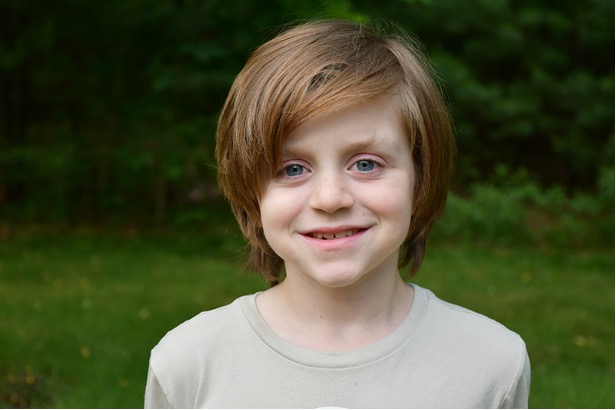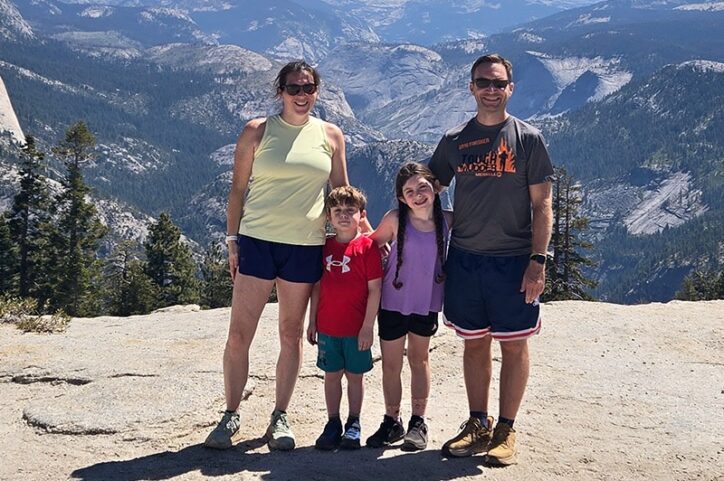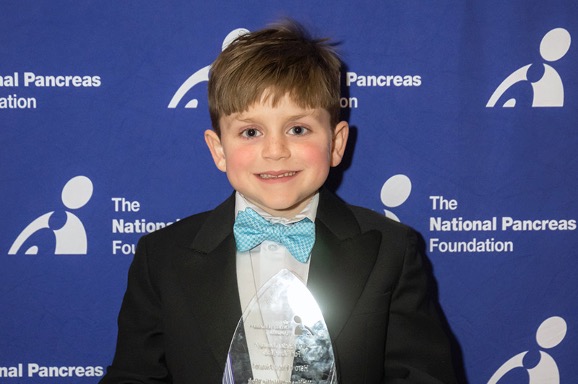A true hero’s journey: How a team approach helped Wolfie overcome pancreatitis

Wolfgang, affectionately known as “Wolfie,” is a bright and energetic 7-year-old with a quick wit and a love for making others smile. He keeps his mom, Cara, his older sister, Cadence, and his dad, Jameson, laughing with his playful humor. Behind the laughter and love, Wolfie and his family have been navigating a difficult medical journey — one marked by strength, hope, and unwavering support for one another.
When cancer treatment took an unexpected turn
In February 2023, at just 5 years old, Wolfie was diagnosed with B-cell acute lymphoblastic leukemia, a form of cancer in the blood. He began what was expected to be a standard — though intense — course of cancer treatment at the Dana-Farber/Boston Children’s Cancer and Blood Disorders Center. But early into chemotherapy, he developed severe abdominal pain that turned out to be acute pancreatitis — a rare but serious side effect of certain cancer therapies that causes the pancreas to become inflamed.
As Wolfie’s pancreatitis worsened, fluid-filled sacs called pseudocysts developed in his pancreas, and his leukemia treatment had to be paused multiple times to assess what was happening. “It was a constant back-and-forth of not wanting to stop the cancer treatment but needing to so that we could make sure his pancreas wasn’t swelling any more than it already was,” explains Jameson.
Over that summer, he spent weeks in and out of the hospital, often unable to eat or drink without severe pain. IV fluids kept him nourished and rainbow-colored lollipops became one of the few foods he could safely enjoy.
“He was incredibly sick. Whenever he’d be able to come home, he’d have to stay in bed in a dark room because everything was hurting him,” explains Cara.

A lifeline of expert care
Wolfie’s complex condition required the collaboration of multiple departments at Boston Children’s. Specialists from the Dana-Farber/Boston Children’s Cancer and Blood Disorders Center, the Division of Gastroenterology, Hepatology, and Nutrition, the Pancreatic Disorders Program, and the Pain Treatment Center worked closely to manage both his leukemia and pancreatitis.
Pancreatic Disorders Program
One of the only pediatric-focused programs of its kind in the country, the Pancreatic Disorders Program brings together gastroenterologists, therapeutic endoscopists, surgeons, radiologists, geneticists, endocrinologists, nutritionists, pain specialists, psychologists, and social workers to create unique and specialized care plans for each patient. Their coordinated approach helped make sure that every part of Wolfie’s care — medical, nutritional and emotional — was addressed in real time and to their highest capabilities
At the center of his pancreatic care team was Dr. Amit Grover, director of the Pancreatic Disorders Program. When Wolfie’s pseudocysts became infected, Dr. Grover performed multiple endoscopic drainage procedures with placement of metal stents to relieve the pressure from the fluid collections and promote healing of his severely inflamed pancreas.
“Dr. Grover became a huge support for all of us,” says Cara. “He was gentle with Wolfie and really leaned into the ‘Grover’ aspect of his name — making things easy to understand for Wolfie as if he was on Sesame Street. But he also made sure Wolfie was getting the best care possible during what was one of the darkest times of our lives. We felt more confident after each visit with Dr. Grover and his team than before.”
Throughout his care, Dr. Grover worked closely with the rest of his medical team to ensure Wolfie could continue his cancer treatments safely and progress into remission.
Resilience against the odds
In 2024, nearly a year after Wolfie’s diagnosis, his final pancreatic stent was removed. With his pseudocysts completely gone and flare-ups under control, he was finally well enough to begin kindergarten. Though he joined the school year late, it marked a major milestone — not just in his treatment, but in reclaiming his childhood.
“Wolfie was determined to be there with his classmates,” explains his mom. “He had really hard days — we all did — but seeing him start school was a really big moment for all of us.”

New beginnings fueled by hope
This past spring, Wolfie received the National Pancreatic Foundation’s “Hero of Hope” award, a recognition of the extraordinary resilience he showed during his medical journey, and a tribute to the care team that stood by his side. Dressed in a tuxedo during the ceremony, Wolfie — who insisted his dad match him — beamed when Dr. Grover presented the award in front of a huge crowd to him.
Today, Wolfie is in remission from cancer and returns to the hospital only for routine checkups. Most days, he’s back to doing what kids his age love most: playing soccer, building elaborate LEGO creations, and enjoying the small joys that once felt so far away, like eating his favorite candy.
“It was a really hard time for two years,” says Jameson. “But we got through it together as a family.”
For more, visit the Pancreatic Disorders Program and Dana-Farber/Boston Children’s Cancer and Blood Disorders Center. To make a referral, please email pancreas@childrens.harvard.edu.
Related Posts :
-

A toast to BRD4: How acidity changes the immune response
It started with wine. Or more precisely, a conversation about it. "My colleagues and I were talking about how some ...
-

Tough cookie: Steroid therapy helps Alessandra thrive with Diamond-Blackfan anemia
Two-year-old Alessandra is many things. She’s sweet, happy, curious, and, according to her parents, Ralph and Irma, a budding ...
-

A new druggable cancer target: RNA-binding proteins on the cell surface
In 2021, research led by Ryan Flynn, MD, PhD, and his mentor, Nobel laureate Carolyn Bertozzi, PhD, opened a new chapter ...
-

Forecasting the future for childhood cancer survivors
Children are much more likely to survive cancer today than 50 years ago. Unfortunately, as adults, many of them develop cardiovascular ...





